By
Cynthia M. Lardner
International criminal tribunals have been created to redress the harm done to millions of victims as a result of genocide, crimes against humanity, and war crimes, to provide reparations, and to act as a deterrent. Vested with the authority to proceed when nations are unable to effectively adjudicate matters internally and when efforts at diplomacy have failed are the International Criminal Court (ICC), and ad hoc and hybrid courts. The International Court of Justice (ICJ) can handle civil matters brought by one member nation against another. The establishment of these courts is a milestone in the history of mankind.
“In our own lifetimes, in conflicts unfolding even today, atrocities have been planned and executed, leaving behind victims of widespread or systematic crimes. Societies across the globe have been deeply scarred and divided by crimes such as attacks on civilians, murder, using child soldiers and rape as a tool of war. Violence in one place inevitably causes instability in others. For some, this may seem a distant if disturbing fact, but for hundreds of thousands of others, it is their only reality,” stated ICC President Silvia Fernández de Gurmendi at an address commemorating the 2015 International Day of Justice.
Given all of the mass atrocities one would expect a plethora of convictions. This has not occurred. It is not an issue of commitment by those individuals employed by or those countries and leaders supporting these tribunals. Rather, the questions that the process begets are whether it is sufficiently independent, whether there is adequate funding, and whether there exists an adequate level of international support and cooperation. For instance, as these courts lack a police force, they rely on the cooperation of states to effectuate arrests, freeze assets, and enforce sentences.
As ICC President Fernández de Gurmendi stated, to be effective “…national, regional and international actors alike must be aligned in their commitment to Rule of Law, human rights and justice.”
The International Criminal Court
Introduction
The ICC was the first permanent international criminal court. It is “the embodiment of our collective conscience,” stated former United Nations Secretary General Kofi Annan.
The ICC was created by the Rome Statute on July 2, 2002 as a court of last resort, intervening only when member states are unwilling or unable to prosecute to prevent those guilty of genocide, crimes against humanity, and war crimes from evading justice. Going forward, in 2017, it may have subject matter jurisdiction over crimes of aggression based on an upcoming vote of the Assembly of States. The ICC prosecutes individual state actors.
The ICC is here to “insure adherence to international humanitarian and human rights law… Perpetrators of crimes must be brought to justice,” stated U.N. Secretary-General Ban Ki-moon at the April 2016 inauguration of the new ICC complex in The Hague.
Thus far, 124 states have ratified and are party to the Rome Statute. An additional 31 countries have signed but have not ratified the Rome Statute, including the United States, Egypt, Iran, Israel and Russia. The question exists whether enough countries have ratified the Rome Statute.
The United States’ decision to never ratify the Rome Statute was and is based on its desire to protect its troops from potentially politically motivated or frivolous prosecutions. Another consideration is that the comprehensive civil rights and war crimes legislation exists in the U.S. Nonetheless, the Obama Administration has made efforts to improve U.S. relations with the ICC.
China, India, Pakistan, Indonesia and Turkey are not parties to the Rome Statute
The ICC was intended to stand as an independent international organisation separate from the United Nations (U.N.) system. However, under the Rome Statute a relationship exists between the ICC and the United Nations Security Council (UNSC). Under Chapter VII of the U.N. Charter, the UNSC can refer situations in which one or more crimes appear to have been committed in any State, regardless of whether it has ratified the Rome Statute. Article 16 of the Rome Statute gives the UNSC the power to defer any ICC investigation for up to a year, which can be renewed once a year by resolution under Chapter VII. In order to exercise this authority, the UNSC must demonstrate that further ICC involvement would impede the UNSC’s ability to maintain or restore international peace and security. The UNSC has never used its Article 16 power.
The ICC is administered by the Assembly of States parties, which elects the court’s judges and prosecutor, as well as setting the ICC’s budget, which is funded by member nations. Some countries have called upon the United States to ratify the Rome Statute so that it will be responsible for absorbing part of the cost.
To date, 23 cases have been brought before the ICC, with nine cases at the investigatory pre-trial level, six cases at the trial stage, three cases that have issued findings of guilty and there having been one acquittal.
The first two cases resulting in ICC guilty convictions occurred in 2012 and 2014 were for war crimes and crimes against humanity arising out of the 2002-2003 genocide in the DRC. This was the most deadly genocide since World War II, with between three to five million mostly civilian causalities, mostly women and girls, as well as members of several ethnic groups. The third conviction occurred on March 21, 2016 was of Jean-Pierre Bemba Gombo on two counts of crimes against humanity and three counts of war crimes committed in the Central African Republic.
Success cannot only be defined by the number of convictions, as explained by Ana Cristina Rodriguez Pineda, Chef de Cabinet-ICTY President: “[The] ICC’s success is related to the domestication of the Rome Statute” with “governments, including former authoritarian regimes, adhering to the R2P.”
Further ICC success comes from its companion organization, the Trust Fund for Victims. Created by the Rome Statute and funded by member states, it encourages restorative justice by providing assistance to victims of crimes in situations where the perpetrators are unable to make reparations to the victims. To date, direct reparations have been made to 59,695 victims, and indirect reparations have been made to 126,703 victims, predominately in the Democratic Republic of the Congo (DRC) and Uganda.
The main criticism of the ICC is that is has thus far focused mainly on Africa. Many Africans believe that this is evidence that the ICC is biased. This line of thinking must be seen in connection with the fact that any decision by the court, or its prosecutor, is always viewed in political terms, making it very hard for the ICC to maintain its image of neutrality and objectivity.
However, the ICC recently opened Preliminary Examinations in situations involving Ukraine, Georgia and Palestine. Analysis is handled by the Office of the Prosecutor (OTP), which operates independently from the judicial side of the court. The OTP conducts a preliminary situational analysis, and decides whether or not to move to an investigation. In such eventuality, evidence is gathered and, if merited, the pretrial stage opens with requests for summonses to appear or for arrest warrants against suspects. If the Pre-Trial Chambers confirms the charges, the suspect appears either voluntarily or after being arrested. At that time the case proceeds to trial.
Palestine
The UNSC has twice denied Palestine’s request to be recognized as a U.N. member nation. After the first denial, in 2012, Palestine was granted non-member observer state status in the U.N. The most recent denial occurred on December 31, 2014 following Israel’s Operation Protective Edge with the U.S. casting a sole veto.
Palestine then turned to the ICC for redress of the war crimes, genocide and crimes against humanity committed after June 13, 2014. The process started with Palestine lodging a declaration under article 12(3) of the Rome Statute accepting the ICC’s jurisdiction as to alleged crimes committed “in the occupied Palestinian territory, including East Jerusalem, since June 13, 2014” by either side. On January 2, 2015 Palestine acceded to the Rome Statute by depositing its instrument of accession with the U.N. Secretary-General. The Rome Statute took effect on April 1, 2015.
On January 1, 2015 the OTP commenced a Preliminary Examination. The opening of a Preliminary Examination should not be construed as acceptance to proceed to trial as the OTP has not yet made the determination that the jurisdictional requirements have been met. Israel was initially uncooperative but since July 9, 2015 it has provided information while still questioning whether the ICC can exercise jurisdiction as Palestine has not been recognized by the U.N. as an independent state.
On November 12, 2015, the OTP issued a preliminary report based on an analysis of 66 communiques from Israel, the Palestinians and various organizations around the world detailing incidents of Operation Protective Edge, alleged settlements, related war crimes, and other issues. Among the documents is the June 2015 report issued by the UN Independent Commission of Inquiry on the 2014 Gaza Conflict calling for accountability for documented war crimes by both Israeli forces and Palestinian armed groups during the 50-day conflict. There also exists a July 9, 1996 ICJ advisory opinion affirming that the Gaza Strip and the West Bank, including East Jerusalem, are “occupied Palestinian territory,” and that Israel’s wall, as well as its settlements, violated the Fourth Geneva Convention.
The ICC is continuing its evaluation, a process which could take from months to several years to complete. Based on the analysis, the OTP will determine whether to move to an investigation.
Depending on the outcome, any convictions of the responsible individuals must be enforced by either Israel and/or Palestine, or by states where the suspects are present on their territories.
In addition, many countries have attempted to broker peace long overdue in Israel and Palestine. There has been some speculation that the Obama administration would support a modified French resolution to pressure Israel to a political settlement, this has not yet happened. That resolution involves the two-state solution, long been rejected by Israeli Prime Minister Benjamin Netanyahu. An ICC finding of guilt might provide the international community with the necessary leverage to effectuate a peaceful resolution.
“Threats to humankind are met by collective action,” stated President Fernández de Gurmendi.
Ukraine and Georgia
On April 17, 2014 Ukraine lodged a declaration under article 12(3) of the Rome Statute accepting the ICC’s jurisdiction with respect to alleged war crimes and crimes against humanity committed by Russia in Maidan, Ukraine’s capital, from November 21, 2013 to February 20, 2014. The matter is now at the Preliminary Examination level. The OTP extended the Preliminary Examination to include a second Article 12(3) declaration lodged by Ukraine on September 8, 2015 covering mass crimes in all Ukrainian territories. This may involve an analysis as to the downing of Malaysian Airlines Flight MH17. It is the first time Russia, a nonmember state, has come under ICC scrutiny.
The Ukrainian case is not the only one involving ICC scrutiny of Russia. On January 27, 2016, the Pre-Trial Chamber authorized the OTP to proceed with an investigation for crimes committed in South Ossetia, Georgia between July 1 and October 10, 2008. In October 2015 the OTP requested that the Pre-Trial Chambers allow the OTP to open a formal investigation into the 2008 war in South Ossetia in which an estimated 13,400 and 18,500 ethnic Georgians were forcibly displaced and where “the ethnic Georgian population living in the conflict zone was reduced by at least 75%.” The OTP, in investigating allegations by all sides to the conflict, argued that its preliminary findings suggested evidence of alleged war crimes and crimes against humanity.
On January 27, 2016 a panel of three judges granted the request, concluding that “there is a reasonable basis to believe that crimes within the ICC’s jurisdiction have been committed in the situation in Georgia” citing charges of “crimes against humanity, such as murder, forcible transfer of population and persecution, and war crimes, such as attacks against the civilian population, willful killing.”
From left to right, United Nations Secretary-General Ban Ki-moon, President of the Court, Sylvia Fernández de Gurmendi, and His Majesty King Wilhelm-Alexander of the Netherlands at the April 19, 2015 Inauguration of the new ICC complex (Cynthia Lardner)
While President Fernández de Gurmendi has stated that “Accountability is a non-negotiable objective,” the reality is, as to enforcement of findings of guilt and reparations, accountability is a negotiable objective.
The inherent problem is one of enforcement. Should Russians or other individual actors be found guilty in either case, the only way the ICC’s decision can be enforced is if the governments involved cooperate in effectuating arrests.
As for discretionary UNSC enforcement, Russia and China are certain to act with impunity by vetoing any resolution as to enforcement. By way of example, consider that, on July 29, 2015, Russia has already vetoed a UNSC resolution to create a special tribunal focused exclusively on culpability for the bombing of Malaysian Airlines flight MH17 and classifying the plane’s downing as a threat to peace and security. China abstained from voting.
Hybrid and Ad Hoc Tribunals
There are ad hoc criminal tribunals, established by the UNSC and funded by the U.N. General Assembly, such as the International Criminal Tribunal for the former Yugoslavia (ICTY), also known as the Balkans Tribunal; the Special Tribunal for Lebanon (STL); and the International Criminal Tribunal for Rwanda (ICTR). There are also hybrid criminal courts created by agreement between the U.N. and the relevant state, having a mixed international and national composition, which are funded by voluntary contributions. The hybrid courts include the Special Court for Sierra Leone (SCSL), and The Extraordinary Chambers in the Courts of Cambodia (ECCC), commonly referred to as the Khmer Rouge Tribunal or the Cambodia Tribunal. The countries whose nationals have been charged have thus far not implicated any of the P5 members or larger European countries. This may be one reason why they have been more effective at delivering justice.
The most successful ad hoc court to date has been the ICTR. The Rwandan Genocide of 1994 was one of the bloodiest since the Holocaust. Over the course of 100 days, from April 6 to July 16, 1994, an estimated 800,000 to 1 million Tutsis and some moderate Hutus were killed before the violence came to a halt. This translates to more than six men, women and children being brutally murdered every minute of every hour of every day for 100 days; four times greater than at the height of the Nazi Holocaust.
Refugees carrying water containers make their way back to their huts at the Benaco Refugee Camp in Tanzania, near the Rwandan border, East Africa, May 17, 1994. (AP Photo/Karsten Thielker)
The ICTR was established by the UNSC in November 1994 in order to hold responsible those individuals responsible for genocide and other serious violations of international law.
According to Matthew Carlson, co-head of ICTR Chambers Legal Support Section, “perpetrators fled to neighboring Republic of the Congo, migrating to other countries including in Europe. Accused were found in 30 countries including the U.S.”
Based in Rwanda, the year after its formation, the ICTR, on September 2, 1998, issued the world’s first conviction for the crime of Genocide. Thereafter, in 5,800 days of proceedings, the ICTR brought indictments against 93 individuals and issued 61 first-instance judgments involving the testimony of over than 3,000 witnesses who bravely recounted some of the most barbaric events imaginable.
Mr. Carlson attributed the ICTR’s success to the “…intense international cooperation to arrest the accused.”
An example of a hybrid court is the STL, based in The Hague and Beirut. According to STL President Judge Ivana Hrdlicková, “The STL was established by the UNSC Council resolution, after an agreement, made between the UN and Lebanon, which was never voted upon by the Lebanese parliament and, therefore, never ratified.”
The STL’s primary mandate is to try the individuals accused of carrying out a February 14, 2005 attack which killed 22 people, including Rafic Hariri, the former Prime Minister of Lebanon, and injured many others. President Hrdlicková stated that the STL’s “purpose is to bring justice to the victims,” like other international criminal courts, for the crime of genocide and crimes against humanity by “applying Lebanese substantive criminal law and international procedural law, which is a combination of civil and common law principles.” In addition, President Hrdlicková stated that the STL “…has special jurisdiction over terrorism.” A unique feature of the STL is that the accused not be present in court.
Another hybrid tribunal worth discussing is the ECCC. The Khmer Rouge regime came into power on April 17, 1975 and was overthrown on January 7, 1979. During the 3 years, 8 months and 20 days period over 1.7 million people died from starvation, torture, execution and forced labour. Over 20,000 mass graves were unearthed revealing 1,386,734 victims in what are now referred to as the Killing Fields.
Following an agreement between the Royal Government of Cambodia and the U.N., the ECCC was formed to prosecute most senior responsible members of the Khmer Rouge massacre. While this was created in conjunction with the U.N., it remains independent, with trials held in Cambodia presided over by both local and international staff.
David John Scheffer, the first United States Ambassador-at-Large for War Crimes, assisted in the ECCC’s creation. Mr. Scheffer stated that the UNSC can block funding for hybrid courts, as was the case with the ECCC. He stated that the ECCC is sustained through voluntary contributions, with the U.S. providing the bulk of its $30 million annual operating budget.
Despite its exorbitant budget, the ECCC has yielded only three convictions of former leaders, Nuon Chea, Kang Kek Iew, and Khieu Samphan, each of whom was sentenced to life in prison. Going forward, one of ECCC’s major impediments is that many of the individuals who could be charged have passed away.
The ECCC has served another purpose. Its presence and open door policy has provided a place for survivors and their families to mourn, and it stands for the proposition that the Cambodian government is committed to adherence of Rule of Law. According to the ECCC, “More than 476,000 people thus far had direct exposure to the ECCC through the court’s robust outreach initiatives. More than 316,000 people, from rural farmers to foreign dignitaries, have visited the ECCC for public hearings, study tours and other visitor programmes. The vast majority are Cambodians from provinces across the country.”
International Court of Justice
Established in June 1945 by U.N. Charter, the International Court of Justice (ICJ) is the U.N.’s principal judicial organ. The ICJ’s role is to settle, in accordance with international law, legal disputes submitted to it by States and to give advisory opinions on legal questions referred to it by authorized United Nations organs and specialized agencies. Unlike the ICC and the hybrid courts, the ICJ does not have a prosecutor and, as such, it is not per se a criminal tribunal. However, civil claims for based on protocols, conventions and treaties prohibiting crimes against humanity’ and genocide may be brought by one member nation against another.
The five UNSC permanent members (P5) – the United States, the United Kingdom, France, China and Russia – always have a representative judge on the 17 judge panel. In addition, the P5 can veto both ICJ and Permanent Court of Arbitration decisions or deny their enforcement.
Among the cases adjudicated by the ICJ include one instituted by Nicaragua against the U.S. based on U.S. support of the Contras in their rebellion against the Nicaraguan government. The Reagan administration refused to participate in the proceedings arguing that the ICJ lacked jurisdiction. On July 27, 1988 the ICJ ruled in Nicaragua’s favor finding that the U.S. interfered with a sovereign state and breached its obligation under international law not to use force against another State. The U.S. withdrew from compulsory ICJ jurisdiction in 1986. It now accepts the ICJ’s jurisdiction on a case-by-case basis.
Consider the Balkan War Genocide, which according to former Canadian Foreign Minister Dr. Lloyd Axworthy, the situation as it unraveled “…made you emotionally and morally ill.” Yet, on February 3, 2015, the ICJ dismissed Croatia’s claim and Serbia’s counter-claim as to Balkan War Genocide in the 1990s which claimed hundreds of thousands of innocent lives. The ICJ’s decision found that the material act of Genocide had been proven by both Croatia and Serbia. Yet, the ICJ reached the incomprehensible decisions that specific intent to engage in Genocide had not been established. It was the second time the ICJ had rejected a claim by Serbia. The decision, which was politicized, was final and binding.
While the P5 failed to veto the ICJ decision, the UNSC had already established the ICTY or Balkans Tribunal on May 25, 1993. According to Dr. Axworthy, this represented “a shift that a sovereign was not a divine right but an obligation to protect your people.” It was the Balkans War that gave rise to the concept of responsibility to protect or R2P.
Conclusion
The ICC, hybrid courts, ad hoc courts, and the ICJ can do much to further the United Nation’s Sustainable Development Goal 16, which is to promote peace, justice and strong institutions for all, and to develop the necessary infrastructure to insure accountable, transparent, and inclusive institutions at the international and national levels. When considering that there are two billion children in the world today and that half of them are subject to some form of violence in their young lives, this is a critical initiative. Its objectives can only be met if there is a concerted international effort.
The author with United Nation Secretary-General Ban Ki-moon at the inauguration of the new ICC complex on April 19, 2016

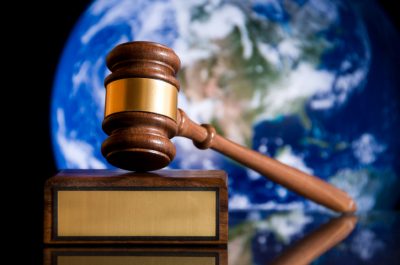
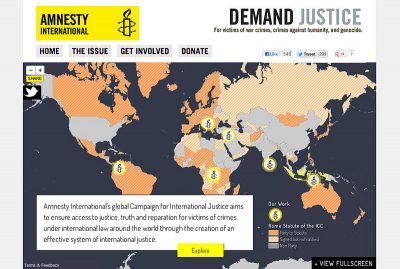
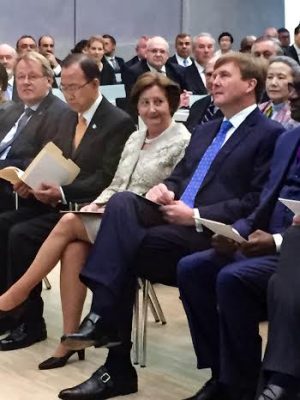

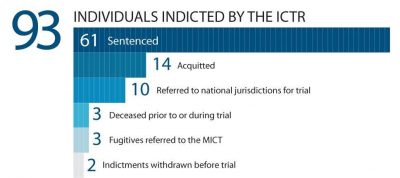
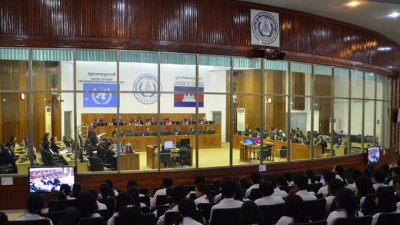
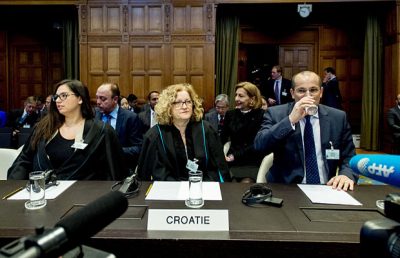
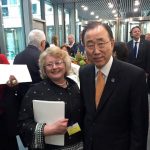
No Comments Yet!
You can be first to comment this post!